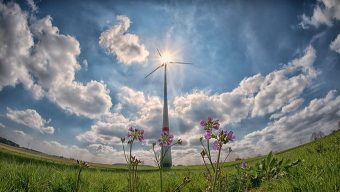
Just days before he secured his overwhelming victory in France’s presidential election, President-Elect Emmanuel Macron’s plans to double France’s wind and solar capacity by 2022 received a major boost.
Late last week the European Commission granted State Aid approval to three French schemes designed to deliver more than 17GW of renewable energy through small scale onshore wind, solar, and sewage gas projects. The policies are expected to put the country on track to meet its EU goal of sourcing 23 per cent of its energy from renewables by 2020.
“[The schemes] are fully in line with the Juncker Commission’s priorities to support investments in renewable energy sources and to ensure that the energy transformation enables EU industry to reach a leading position in low-carbon technologies, thereby fostering green growth and jobs,” the European Commission said in a statement.
The centrepiece of the new investment push will see €1bn a year of financial support provided to new onshore wind projects with fewer than six turbines and an upper limit for each turbine of 3MW.
The 10 year scheme will offer developers a premium on top of the market price for power, known as a “complement de remuneration” and is expected to deliver 15GW of new capacity.
Separately, a new €190m a year solar scheme will offer 20 year of feed-in tariff payments to building-mounted solar systems with less than 100kW of capacity. The policy is expected to provide a major boost to the commercial and residential solar market and is designed to deliver 2.1GW of new capacity.
Completing the trio of measures, a new €58m a year sewage gas support scheme promises a premium on top of the market price for power for projects that harness sewage gas to generate renewable power. The government estimates 160MW of new capacity could be developed, mainly through small scale installations of less than 1MW.
The approval comes as Macron starts work on an ambitious clean tech and environmental programme that promises to mobilise fresh investment in renewable energy, energy efficiency, and electric vehicles, while blocking shale gas and oil exploration.
Separately, Germany reportedly set a new renewable power record late last month as wind, solar, biomass, and hydropower met a record 85 per cent of demand.
The high levels of renewables output meant coal power was almost forced completely off the grid on Sunday April 30th with local media reporting that only a handful of plants were operating for an hour in the afternoon.
Source: businessgreen.com

